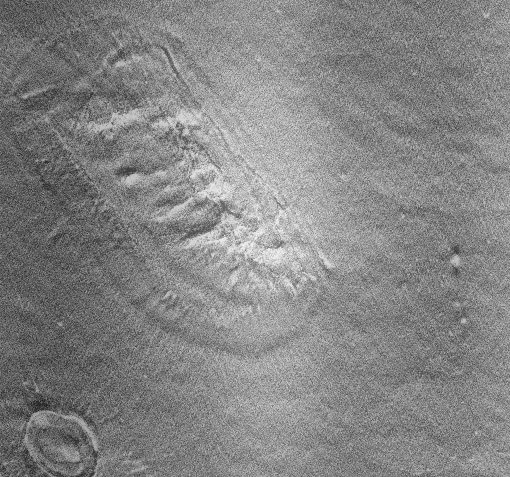Hooberus,
I agree that if you knew little or nothing of the planet Mars, then the picture you showed would be extremely interesting. Many theories of its origins, including intelligent creators, could be put forward. At that point everything is just speculation - no one theory has any advantage over the other. Nothing can be tested.
But then knowledge progresses. You learn more about the planet Mars and find that there is no water, no other signs of intelligent life on the planet. You could probably start to rule out indigenous intelligent creators, but what about space alien intelligent creators?
Then you send another probe to get a better picture and you see this:

Now talk of an intelligent designer seems ridiculous! Not only is there no evidence of an intelligent designer being anywhere near Mars, the object does not even look intelligently designed.
Almost the exact same road has been traveled by the question of our origins:
At first with little information, naturalists set out to highlight god's creation in nature. This seemed perfectly plausible at the time - everyone knew god created everything as set out in the scriptures, right? Everything looked like it was perfectly designed for its niche in the environment.
Then as the body of knowledge grew, people started noticing paterns and heirarchies in the fossil layers. They noticed that life has been on earth for a very long time. They started applying the scientific method, which requires theories to be testable. This means that the new theories had to agree with the new data they were finding.
Darwin publishes his theory of evolution which matches neatly with the data at the time. Other evolutionary theories that did not fit observation, such as Lamarkism, fell by the wayside. Most scientists still felt that god had created life using evolution, though.
As knowledge progressed, people started finding (or at leas acknowledging) things in nature that suggested that the design of life isn't very intelligent at all. Some would say it's short-sighted. Even Darwin acknowledged this in his day. As the scientific method evolved and data increased, the need to postulate a designer that guided evolution became unnecessary for most all scientists. (Many had figured this out much earlier). Yes, a god or gods may be doing it, but there is no evidence of it, so there is no point advancing non-falsifiable theories in the face of falsifiable ones. Naturalistic theories were able to explain why life fit its environment so well as to initially look intelligently designed.
So what originally looked to be obviously designed (face on Mars/Life) turned out to look less and less designed as it was examined. Today, we recognize such intelligent design arguments as 'god of the gaps' reasonings - unseen beings are postulated to explain the current gaps in our knowledge. They are not scientific and do not lead to useful theories or results. They do not end up teaching us any more about our universe. In fact, they can slow scientific progress as they did in the days when Creation was assumed as fact. As time goes on, these 'gaps' get smaller and smaller until the role of such a postulated invisible being is miniscule.
To me the natural laws that govern the universe, including the evolution of life are beautiful (though at times ugly from our anthropic standpoint as well). I don't see why god couldn't use such natural laws to create life. Of course, such a god might not resemble the god you have in mind.
rem
